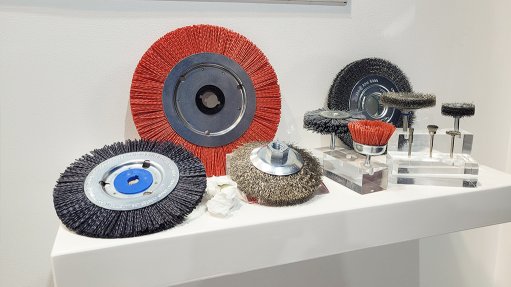
REALISING 4IR BENEFITS Companies need to understand the importance of using appropriate and high-quality consumables for robot applications
S
urfaces and material cutting tool solutions manufacturer PFERD, has invested in improving its supply chain, warehousing and logistics systems to mitigate the raw material shortages and supply chain constraints in the global market.
The company’s training facilities and capabilities, as well as its ability to cater for Fourth Industrial Revolution (4IR) technologies, will also help the company continue to grow in the local market.
The company has also engaged with its suppliers to secure the long-term supply of raw materials and stock, states PFERD administration and marketing manager Hannes Nortman.
“We’ve looked at our complete supply chain – from raw material to the end-product – to see where we can improve. We’ve also secured stock for the long term, ensuring that we have sufficient stock locally to absorb some of the logistical delays we’ve experienced.”
He stresses that heightened costs in the freight shipping industry, as well as a lack of container and equipment availability, have added to logistical challenges, in addition to port congestion.
“We would like to achieve a 98% stock availability to make sure we can continue supply. We examined our supply chain to see where we can make improvements in order to absorb costs and supply more efficiently.”
To accommodate the increased stockholding, PFERD streamlined its storage and dispatch processes to use current resources more effectively, adds Nortman.
“We’ve looked at our in-house processes and invested in time and cost-saving initiatives. When our resources are allocated, they’re allocated to strategic investments to bring value to our customer base. Freight costs increased significantly, so we had to find ways of optimising our logistical processes to not merely pass the cost onto our customer.”
The PFERDACADEMY, situated at the company’s headquarters in Kempton Park, Gauteng, provides specialised and practical knowledge “from the world of grinding and cutting” for users.
Operators receive training on the tools to ensure they use them optimally. The academy is also responsible for providing consulting and application expertise for the PFERD product range.
“Our training academy facilities include grinding booths and a lecture room. “PFERD can conduct training at the premises and job sites of customers, even in neighbouring countries. We also offer e-learning to accommodate customers who can’t travel due to time and operational constraints,” adds Nortman.
“Making small changes to the way operators think and work – and making sure they are using the correct product most efficiently – goes a long way. We have a focus on training, as it’s important for us to get to the end-user and make sure they get the most out of the products they’re using. We also have retail training to help retailers become more confident and knowledgeable about the products they’re selling.”
4IR Technologies
Nortman says 4IR technologies are becoming more prevalent in the local market.
He emphasises that companies need to understand the importance of using appropriate and high-quality consumables for robot applications, and that using “substandard consumables” after investing in robotic applications can be an inefficient use of money.
“Sometimes, consumables, in the long term, can outweigh the cost of investment in a robotic application. We have a dedicated robotics team, so if customers have a specific 4IR application, our team can look at the application and intended end-goal and recommend the best consumables to achieve the objective.
“It’s vital that customers considering robotic applications partner with someone that can guide them in using the appropriate consumables,” he adds.